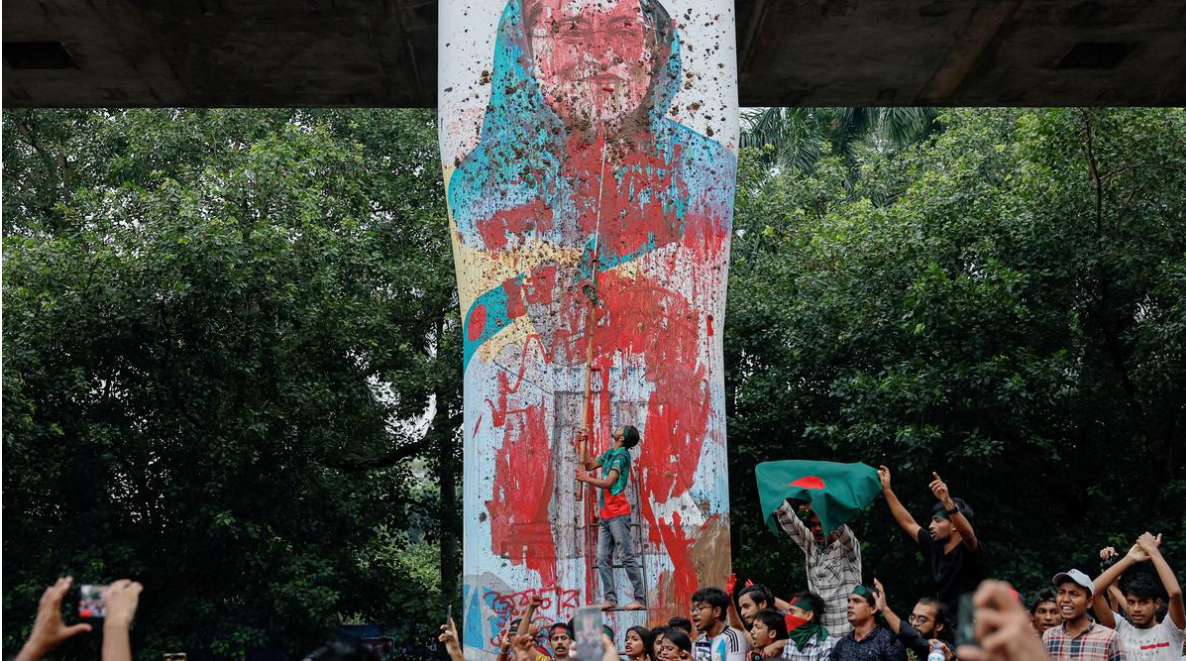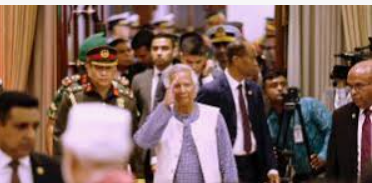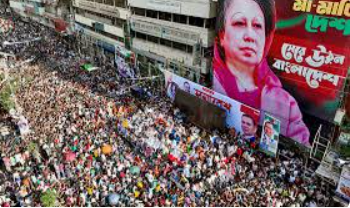Bangladesh’s Student Movement and Hasina’s Exit:-
Bangladesh has recently been rocked by a series of student-led protests that have challenged the entrenched political order and questioned the leadership of Prime Minister Sheikh Hasina. These movements, marked by passionate demands for reform and justice, reflect a broader discontent with the government’s authoritarian tendencies and its handling of key national issues. As Sheikh Hasina faces increasing pressure from these student movements and broader public dissatisfaction, the potential for a significant political shift looms large. For India, this unfolding drama represents both a challenge and an opportunity, requiring a nuanced response to navigate the evolving landscape of regional politics.
This article delves into the origins and significance of Bangladesh’s student movement, the implications of Sheikh Hasina’s possible exit, and the strategic considerations for India as it contemplates its role in this transformative period for its neighbor.
Origins of Bangladesh’s Student Movement
The resurgence of student activism in Bangladesh is rooted in a complex history of youth engagement in politics. Historically, students have been at the forefront of major political changes in the country, from the Language Movement of 1952 to the Liberation War of 1971. In recent years, however, the student movement has gained new momentum, driven by growing frustrations with the current political regime and its policies.  for more information click on this link
for more information click on this link
One of the catalysts for the recent wave of student protests was the 2018 road safety movement, triggered by the tragic deaths of two students in a road accident in Dhaka. The incident highlighted the severe lack of road safety measures and government accountability. What began as a localized protest quickly expanded into a broader critique of the government’s corruption, authoritarianism, and disregard for public welfare.
The student-led protests were notable for their scale and intensity, with thousands of young people taking to the streets to demand immediate reforms. The government’s response, characterized by a heavy-handed crackdown and attempts to silence dissent, further fueled the movement. Despite efforts to suppress the protests, the student movement has continued to grow, addressing a range of issues including political repression, environmental degradation, and educational reforms.
Sheikh Hasina’s Leadership Under Fire
Prime Minister Sheikh Hasina, who has been in power for much of the past two decades, is a figure of considerable influence in Bangladeshi politics. Her tenure has been marked by significant economic growth and infrastructure development, which has helped to elevate Bangladesh’s profile on the global stage. However, her leadership has also been criticized for increasing authoritarianism, with allegations of election rigging, suppression of political opposition, and curtailment of press freedoms.
The student movement has brought these criticisms into sharper focus, challenging the legitimacy of Hasina’s government and calling for a reevaluation of her leadership. The protests have exposed deep-seated grievances among the younger generation, who feel marginalized and disenfranchised by the current political system. The government’s attempts to suppress the student protests, including the use of force and arrests of activists, have only served to galvanize the movement further.
Hasina’s political longevity is both a strength and a liability. On one hand, her long tenure has allowed her to consolidate power and navigate the complexities of Bangladeshi politics with relative ease. On the other hand, the accumulation of power has also led to increasing discontent and a growing perception that her administration is out of touch with the needs and aspirations of the younger generation.
The Implications of Hasina’s Exit
The prospect of Sheikh Hasina’s departure from power, whether through electoral defeat or other means, raises important questions about the future direction of Bangladesh. The transition of power in Bangladesh is likely to be a complex and contentious process, given the polarized nature of the country’s political landscape.
If Hasina were to step down or be ousted, the immediate challenge would be managing the transition of power in a manner that ensures stability and avoids further unrest. The ruling Awami League, which has been dominated by Hasina, would need to find a new leader capable of maintaining the party’s cohesion and appeal. The lack of a clear successor and the factionalism within the party could create a power vacuum and lead to internal strife.  for more information click on this link
for more information click on this link
On the other hand, the opposition Bangladesh Nationalist Party (BNP) would likely seek to capitalize on the opportunity presented by Hasina’s exit. The BNP, led by Khaleda Zia, has been a key rival to the Awami League, and its return to power could significantly alter the political dynamics in Bangladesh. However, the BNP itself has faced challenges, including internal divisions and legal issues related to Khaleda Zia’s imprisonment.
The student movement, which has largely remained outside the traditional party structures, could play a crucial role in shaping the post-Hasina political landscape. The movement’s demands for reform and accountability could drive the new political agenda, potentially leading to significant changes in governance and policy. However, there is also the risk that the movement could face co-optation by political parties or become more radicalized if its demands are not met.
India’s Strategic Interests and Challenges
For India, Bangladesh is a critical neighbor with whom it shares deep historical, cultural, and economic ties. The stability of Bangladesh is of strategic importance to India, both in terms of regional security and economic cooperation. Under Sheikh Hasina, India and Bangladesh have enjoyed a positive and cooperative relationship, with increased collaboration in areas such as trade, infrastructure, and counterterrorism.
The potential for political upheaval in Bangladesh poses several challenges for India. A shift in leadership could lead to changes in Bangladesh’s foreign policy, potentially affecting its alignment with India. There is also the possibility that a new government might pursue a different approach to bilateral issues, such as water sharing agreements and border security.
India’s response to the situation in Bangladesh must balance its strategic interests with its commitment to democratic values. India has traditionally taken a cautious approach to its neighbors’ internal affairs, but the scale and significance of the student movement in Bangladesh may necessitate a more proactive stance. India could play a constructive role in supporting a peaceful and democratic transition by engaging with a broad spectrum of political actors and promoting dialogue and reconciliation.  for more information click on this link
for more information click on this link
The Geopolitical Implications
The developments in Bangladesh have broader geopolitical implications for the region. Bangladesh’s strategic location, at the crossroads of South and Southeast Asia, makes it a key player in regional politics. The country’s growing economic importance, particularly as a hub for trade and manufacturing, has attracted the interest of major powers, including China and the United States.
China has been expanding its influence in Bangladesh through investments in infrastructure and economic development projects, part of its Belt and Road Initiative (BRI). This increased presence of China in Bangladesh raises concerns for India, which views China’s growing footprint in its neighborhood with apprehension. A change in Bangladesh’s leadership could potentially alter the balance of regional power and impact India’s strategic positioning.
The United States, meanwhile, has expressed concern about the state of democracy and human rights in Bangladesh. The U.S. has called for free and fair elections and supports efforts to address democratic backsliding. As Bangladesh navigates this period of uncertainty, the U.S. will likely continue to monitor the situation closely, balancing its support for democratic governance with its strategic interests in the region.
Human Rights and Civil Society
The student movement in Bangladesh has highlighted significant human rights concerns, particularly regarding freedom of expression, assembly, and the press. The government’s response to the protests has been criticized by international human rights organizations, which have reported instances of excessive use of force, arbitrary detentions, and restrictions on media freedom.
The international community’s response to these human rights issues will be crucial in shaping the outcome of the student movement and the broader political situation in Bangladesh. Support for human rights and democratic principles will be important in ensuring that the voices of dissent are heard and that the government is held accountable for its actions.
Civil society in Bangladesh, including NGOs, human rights groups, and independent media, has been a vital force in advocating for reform and transparency. However, civil society organizations face significant challenges, including legal restrictions and threats from both state and non-state actors. International support for Bangladesh’s civil society will be important in sustaining these efforts and promoting a more open and democratic society.  for more information click on this link
for more information click on this link
The Path Forward for Bangladesh and India
As Bangladesh faces a potential transition of power and navigates its current period of political upheaval, the path forward will require careful management and a focus on democratic principles. The student movement, with its demands for reform and accountability, represents a significant force for change, but its success will depend on its ability to maintain momentum and build broad-based support.
For India, the situation in Bangladesh presents both challenges and opportunities. Navigating the evolving political landscape in Bangladesh will require a nuanced approach, balancing strategic interests with support for democratic values. India’s engagement with Bangladesh during this critical period will be important in shaping the future direction of the bilateral relationship and regional stability.
In conclusion, the student movement in Bangladesh and the potential exit of Sheikh Hasina represent a pivotal moment in the country’s political history. The outcome of these developments will have far-reaching implications for Bangladesh, its neighbors, and the broader region. For India, this is an hour of reckoning, requiring careful consideration and strategic foresight to ensure that its interests are protected and that it contributes positively to the promotion of democracy and stability in Bangladesh. ALSO READ:- IPM Modi Continuously Monitoring the Mpox Situation WHO Declares Mpox a Public Health Emergency of International Concern (PHEIC) 2024




